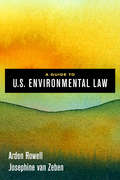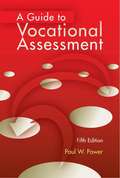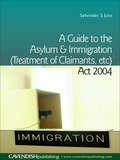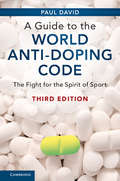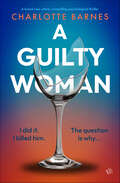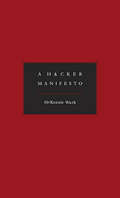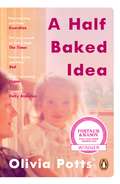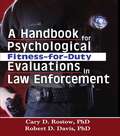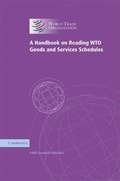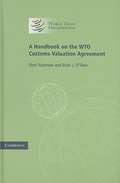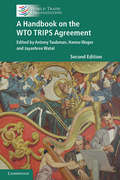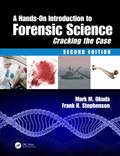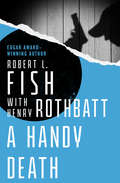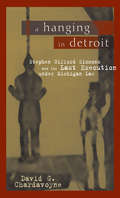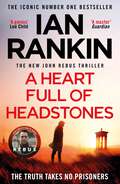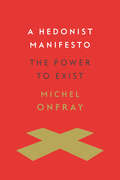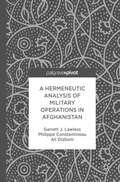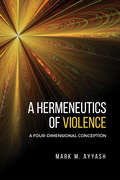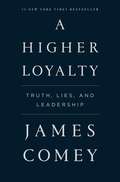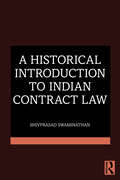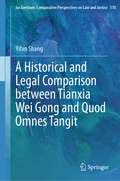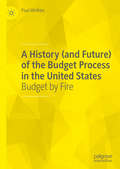- Table View
- List View
A Guide to U.S. Environmental Law
by Arden Rowell Josephine van ZebenWritten by two internationally respected authors, this unique primer distills the environmental law and policy of the United States into a practical guide for a nonlegal audience, as well as for lawyers trained in other regions. The first part of the book explains the basics of the American legal system: key actors, types of laws, and overarching legal strategies for environmental management. The second part delves into specific environmental issues (pollution, ecosystem management, and climate change) and how American law addresses each. Chapters include summaries of key concepts, discussion questions, and a glossary of terms, as well as informative "spotlights"—brief overviews of topics. With a highly accessible structure and useful illustrative features, A Guide to U.S. Environmental Law is a long-overdue synthetic reference on environmental law for students and for those who work in environmental policy or environmental science. Pairing this book with its companion, A Guide to EU Environmental Law, allows for a comparative look at how two of the most important jurisdictions in the world deal with key environmental problems.
A Guide to Vocational Assessment 5th Edition
by Paul W. PowerThis fifth edition of A Guide to Vocational Assessment acknowledges the changes in social and economic systems facing adults with disabilities. It suggests multiple evaluation approaches and insights that can be used to change the difficult to the possible and eventually to the probable. While many chapters underscore the use of traditional evaluation approaches, other chapters operationalize vocational assessment as an individualized, creative, empowering, holistic process and experience of self-discovery.
A Guide to the Asylum and Immigration (Treatment of Claimants, etc) Act 2004
by Satvinder JussImmigration law and policy is so controversial and contested that major legislation has been passed every three years since 1993, with three Bills in the last four years alone. None, however, has been more major and controversial than the latest installment, the Asylum Immigration (Treatment of Claimants, etc.) Act 2004. This attempts to deal with applicants who lodge groundless appeals to delay removal and undocumented arrivals seeking asylum. It makes major institutional and structural changes. These will abolish the two-tier immigration appeals system, by instituting a single tier appellate body with limited rights of judicial review. The Government hopes that this will still safeguard the right of appeal and still provide an effective remedy for those whose application has been refused. There is considerable anxiety, however, about these changes amongst practitioners, advisers and students alike of immigration law. This guide provides a detailed background to the legilslation, discusses the context in which its various provisions are set, and explains how the law will now work.
A Guide to the World Anti-Doping Code: The Fight for the Spirit of Sport
by Paul DavidThe law relating to anti-doping changes rapidly. The World Anti-Doping Code was first adopted in 2003 to provide a common set of anti-doping rules applicable across all sport worldwide. The Code has evolved and changed significantly through two major processes of review. This third edition provides essential guidance and commentary on the 2015 Code which replaces the 2009 Code. The 2015 Code contains many significant changes in the core Articles of the Code, particularly in the regime on sanctions for anti-doping rule violations, and in the amended International Standards. The text outlines how the current law has developed from anti-doping rules and principles in operation before the Code and explains the central role of the Court of Arbitration for Sport in this development and in applying the current Code. This third edition will be an important single resource for any reader working or studying in the field.
A Guilty Woman
by Charlotte BarnesThe truth is sometimes darker than fiction, in this gripping psychological thriller from the author of My Husband the Murderer. When Caroline walks into the bustling hotel bar on a Friday afternoon, no one could have predicted what is about to unfold. With chilling precision, she pulls out a gun and shoots her lover five times in cold blood. The crime, committed in plain sight, leaves no room for doubt—Caroline is guilty. But when questioned, she offers no explanation and refuses to comment. As the case explodes across media outlets, a popular true crime podcast begins to dig deeper into Caroline&’s life. Soon, Caroline&’s uncovered writing becomes the key to understanding her past—and potentially, the dark secrets she has yet to reveal. As her attorney scrambles to defend her, one question lingers: What happens when a killer rewrites their own story? And when her trial approaches, whispers grow about a manuscript she&’s writing from prison—one that might reveal far more than anyone expected . . .A Guilty Woman is perfect for fans of true crime, thrillers, and dark literary mysteries.
A Hacker Manifesto
by McKenzie WarkA double is haunting the world—the double of abstraction, the virtual reality of information, programming or poetry, math or music, curves or colorings upon which the fortunes of states and armies, companies and communities now depend. The bold aim of this book is to make manifest the origins, purpose, and interests of the emerging class responsible for making this new world—for producing the new concepts, new perceptions, and new sensations out of the stuff of raw data. A Hacker Manifesto deftly defines the fraught territory between the ever more strident demands by drug and media companies for protection of their patents and copyrights and the pervasive popular culture of file sharing and pirating. This vexed ground, the realm of so-called “intellectual property,” gives rise to a whole new kind of class conflict, one that pits the creators of information—the hacker class of researchers and authors, artists and biologists, chemists and musicians, philosophers and programmers—against a possessing class who would monopolize what the hacker produces. Drawing in equal measure on Guy Debord and Gilles Deleuze, A Hacker Manifesto offers a systematic restatement of Marxist thought for the age of cyberspace and globalization. In the widespread revolt against commodified information, McKenzie Wark sees a utopian promise, beyond the property form, and a new progressive class, the hacker class, who voice a shared interest in a new information commons.
A Half Baked Idea: Winner of the Fortnum & Mason’s Debut Food Book Award
by Olivia PottsWINNER OF THE FORTNUM & MASON'S DEBUT FOOD BOOK AWARD'A tender and beautifully written tour-de-force on love, grief, hope and cake. If this is not the book of the summer, I will eat my wig. An absolute triumph' THE SECRET BARRISTER 'An utterly beautiful, moving, bittersweet book on love and loss. I loved it' DOLLY ALDERTON _____________________________________________________When Olivia Potts was just twenty five, her mother died. Stricken with grief, she did something life changing and rather ridiculous: she gave up a high-flying legal career to study at the notoriously difficult Le Cordon Bleu, despite not being able to cook. No one ever told Olivia you couldn't bake your way to happiness - but could you?_______________________________________________ 'A brilliant, brave and beautiful book: funny and charming; utterly inspiring and life-affirming' Olivia Sudjic'A heart-wrenching yet humorous portrayal of grief, a delicious collection of recipes, an inspirational tale of changing careers, and a feel good love story' Vogue'Funny, sharp and sad. I laughed so much (and I cried)' Ella Risbridger, author of Midnight Chicken'An honest, brave and funny account of what it is to love, to lose love and how to make macarons' Red
A Handbook for Psychological Fitness-for-Duty Evaluations in Law Enforcement
by Cary D. Rostow Robert D. DavisWhile some books about police psychology contain a chapter on the fitness-for-duty question, this is the first comprehensive publication focused exclusively on psychological fitness-for-duty evaluations (FFDEs) for law enforcement personnel. This handbook is ideal for professionals and for coursework designed to prepare individuals for careers as police or municipal officials, psychologists, students, behavioral science specialists, human rights advocates, and attorneys. A helpful glossary makes the book even more useful for students and those who do not have extensive academic or formal training in psychology or public administration. A Handbook for Psychological Fitness-for-Duty Evaluations in Law Enforcement describes in detail the mechanics of setting up a fitness-for-duty methodology and examines the effectiveness of FFDEs in law enforcement. You’ll find clear instructions for developing a FFDE system from the law enforcement executive’s viewpoint (valuable for attorneys, police psychologists, and civil service board members as well), and an extensive bibliography with particular emphasis on laws and cases that provide guidance to psychological and law enforcement professionals. Several appendices provide examples of documentation that can be used in the evaluation process. This book brings you reliable information on: legal precedents, with a review of legal cases (in language appropriate for law enforcement executives and psychologists) the interaction between police culture, psychological assessment, and therapy federal laws that impact FFDEs, including the HIPAA, the Americans with Disabilities Act, the Family Medical Leave Act and the Fair Credit Reporting Act case law and FFDEs, with emphasis on civil rights laws, labor issues, professional ethical dilemmas, and the psychologist as a potential expert witness the proper uses—and the misuses—of the FFDE approach police departmental civil liability and the role that the FFDE plays in addressing legal risks In addition, this book contains a succinct review of psychological testing (psychometrics), and the technicalities of employing a professional psychologist to determine the fitness of commissioned officers. A Handbook for Psychological Fitness-for-Duty Evaluations in Law Enforcement proposes a model law that could be used to improve the utility and effectiveness of FFDEs, and presents a forward-looking discussion of FFDE issues that may become controversial in the near future.
A Handbook on Reading WTO Goods and Services Schedules
by Wto SecretariatThis is a detailed guide on how to read WTO Schedules of Commitments for Goods and Services. The Schedules are part of the Legal Texts of the WTO Uruguay Round Agreements. They comprise about 27,000 pages of specific commitments by 153 members of the WTO on market access conditions for their markets. Understanding how to interpret the Schedules is essential for anyone wishing to glean information for academic, official, or business purposes. Commissioned and reviewed by the WTO Secretariat, this is a unique guide to understanding the Schedules.
A Handbook on the WTO Customs Valuation Agreement
by Sheri Rosenow Brian J. O'SheaThis guide to the WTO Customs Valuation Agreement is based on the authors' experiences of teaching its finer points to customs officials and policy-makers around the world. Covering the methods of valuation and the provisions on enforcement, implementation and dispute settlement, the authors give practical examples, explain interpretative decisions of national and international customs bodies, and analyse the history of its negotiation. Written as a learning tool, it helps both new and experienced policy-makers, customs officials, importers and exporters to gain a deeper understanding of the Agreement's function and aims.
A Handbook on the WTO TRIPS Agreement
by Anthony Taubman Hannu Wager Jayashree WatalThis handbook describes the historical and legal background to the TRIPS Agreement, its role in the WTO and its institutional framework. It reviews the following areas: general provisions and basic principles; copyright and related rights; trademarks; geographical indications; patents; industrial designs, layout-designs, undisclosed information and anti-competitive practices; enforcement of IPRs; dispute settlement in the context of the TRIPS Agreement; TRIPS and public health; and current TRIPS issues. It contains a guide to TRIPS notifications by WTO members and describes how to access the official documentation relating to the TRIPS Agreement and related issues. Furthermore, it includes the legal texts of the TRIPS Agreement and the relevant provisions of the WIPO conventions referred to in it, as well as subsequent relevant WTO instruments and related non-WTO treaties. The new edition covers the public health revision of the Agreement that entered into force in 2017 and provides updates on other recent developments.
A Hands-On Introduction to Forensic Science: Cracking the Case, Second Edition
by Mark M. Okuda Frank H. Stephenson, PhD.A Hands-On Introduction to Forensic Science, Second Edition continues in the tradition of the first edition taking a wholly unique approach to teaching forensic science. Each chapter begins with a brief, fictional narrative that runs through the entire book; it is a crime fiction narrative that describes the interaction of a veteran homicide detective teamed with a criminalist and the journey they take together to solve a missing persons case. Step-by-step the book progressive reveals pieces of information about the crime, followed by the more traditional presentation of scientific principles and concepts on a given forensic topics. Each chapter concludes with a series of user friendly, cost effective, hands-on lab activities that provide the students the skills necessary to analyze the evidence presented in each chapters. The new edition is completely updated with special focus on new DNA techniques in DNA sequencing, DNA phenotyping, and bioinformatics. Students will engage in solving a missing persons case by documenting the crime scene, analyzing physical evidence in the lab, and presenting findings in a mock trial setting. Within the chapters themselves, students learn about the technical, forensic concepts presented within each of the opening stories segments. The book culminates with having the students playing to role of the main characters in a trial—attorneys, scientific experts, suspect, judge, bailiff, and jury—to present and judge the evidence in a mock trial setting. The mock trial will mimic what takes place in a real courtroom, and the jury of swill be asked to deliberate on the evidence presented to determine the guilt or innocence of the suspect.
A Handy Death
by Robert L. Fish Henry RothbattA lawyer agrees to defend an ex-baseball prospect accused of murder In 1964, nineteen-year-old Billy Dupaul was on his way to stardom. A modest farm boy with a lightning fastball, he had just signed a record contract with the New York Mets when a single gunshot changed his life forever. Dupaul went down on an attempted murder rap, and the Mets washed their hands of him. Eight years later, the man he was said to have shot drops dead when a shard of bullet works its way into his brain. After eight summers in Attica, Billy is about to be tried for murder. After throwing him to the wolves in 1964, the vice president of the Mets shows surprising interest in the case and hires Hank Ross, one of the toughest defense attorneys in Manhattan, to save the boy from the chair. It's an impossible assignment, and Ross will find the case has more bite than any big-league curve.
A Hanging in Detroit: Stephen Gifford Simmons and the Last Execution under Michigan Law
by David G. ChardavoyneThe first historical study--and a riveting account--of the last execution in Michigan.
A Heart Full of Headstones: The Gripping New Must-Read Thriller from the No.1 Bestseller Ian Rankin
by Ian RankinTHE BRAND NEW REBUS THRILLER FROM THE ICONIC NUMBER ONE BESTSELLER. ONE OF THE MUST-READ NOVELS OF THE YEAR. John Rebus had been in court plenty of times, but this was his first time in the dock... John Rebus stands accused: on trial for a crime that could put him behind bars for the rest of his life. Although it's not the first time the legendary detective has taken the law into his own hands, it might be the last.What drove a good man to cross the line? Or have times changed, and the rules with them?Detective Inspector Siobhan Clarke faces Edinburgh's most explosive case in years, as a corrupt cop goes missing after claiming to harbour secrets that could sink the city's police force.But in this investigation, it seems all roads lead to Rebus - and Clarke's twin loyalties to the public and the police will be tested to their limit.A reckoning is coming - and John Rebus may be hearing the call for last orders...* * * * *PRAISE FOR A HEART FULL OF HEADSTONES:'I loved it hugely! Rebus is one of fiction's greatest creations.'MARIAN KEYES'Phenomenal ... The ending is going to floor readers. Everyone is going to be talking about this!'MICK HERRON'Magnificent - beautifully written, clever - and what an ending!'KATE MOSSE'Peerless. Immaculately crafted, gripping, intricately textured. By turns wry, brutal, unflinching, heart-filled.'SARAH VAUGHAN'The standout novel from one of the great storytellers of our generation ... The kind of ending you won't ever forget.'CHRIS WHITAKER* * * * *PRAISE FOR THE ICONIC NUMBER ONE BESTSELLER IAN RANKIN:'Ian Rankin is a genius'LEE CHILD'Rebus is one of British crime writing's greatest characters: alongside Holmes, Poirot and Morse'DAILY MAIL'Whatever he writes, it will be worth reading ... Rankin has redefined the genre' GUARDIAN'The arrival of a Rankin novel remains one of life's pleasures' EXPRESS'Rankin is a phenomenon'SPECTATOR'Worthy of Agatha Christie at her best'SCOTSMAN'The king of crime fiction'SUNDAY EXPRESS'Great fiction, full stop'THE TIMES
A Heart Full of Headstones: The Gripping New Must-Read Thriller from the No.1 Bestseller Ian Rankin
by Ian RankinTHE BRAND NEW REBUS THRILLER FROM THE ICONIC NUMBER ONE BESTSELLER. ONE OF THE MUST-READ NOVELS OF THE YEAR. John Rebus had been in court plenty of times, but this was his first time in the dock... John Rebus stands accused: on trial for a crime that could put him behind bars for the rest of his life. Although it's not the first time the legendary detective has taken the law into his own hands, it might be the last.What drove a good man to cross the line? Or have times changed, and the rules with them?Detective Inspector Siobhan Clarke faces Edinburgh's most explosive case in years, as a corrupt cop goes missing after claiming to harbour secrets that could sink the city's police force.But in this investigation, it seems all roads lead to Rebus - and Clarke's twin loyalties to the public and the police will be tested to their limit.A reckoning is coming - and John Rebus may be hearing the call for last orders...* * * * *PRAISE FOR A HEART FULL OF HEADSTONES:'I loved it hugely! Rebus is one of fiction's greatest creations.'MARIAN KEYES'Phenomenal ... The ending is going to floor readers. Everyone is going to be talking about this!'MICK HERRON'Magnificent - beautifully written, clever - and what an ending!'KATE MOSSE'Peerless. Immaculately crafted, gripping, intricately textured. By turns wry, brutal, unflinching, heart-filled.'SARAH VAUGHAN'The standout novel from one of the great storytellers of our generation ... The kind of ending you won't ever forget.'CHRIS WHITAKER* * * * *PRAISE FOR THE ICONIC NUMBER ONE BESTSELLER IAN RANKIN:'Ian Rankin is a genius'LEE CHILD'Rebus is one of British crime writing's greatest characters: alongside Holmes, Poirot and Morse'DAILY MAIL'Whatever he writes, it will be worth reading ... Rankin has redefined the genre' GUARDIAN'The arrival of a Rankin novel remains one of life's pleasures' EXPRESS'Rankin is a phenomenon'SPECTATOR'Worthy of Agatha Christie at her best'SCOTSMAN'The king of crime fiction'SUNDAY EXPRESS'Great fiction, full stop'THE TIMES
A Hedonist Manifesto
by Michel Onfray Joseph McclellanMichael Onfray passionately defends the potential of hedonism to resolve the dislocations and disconnections of our melancholy age. In a sweeping survey of history's engagement with and rejection of the body, he exposes the sterile conventions that prevent us from realizing a more immediate, ethical, and embodied life. He then lays the groundwork for both a radical and constructive politics of the body that adds to debates over morality, equality, sexual relations, and social engagement, demonstrating how philosophy, and not just modern scientism, can contribute to a humanistic ethics. Onfray attacks Platonic idealism and its manifestation in Judaic, Christian, and Islamic belief. He warns of the lure of attachment to the purportedly eternal, immutable truths of idealism, which detracts from the immediacy of the world and our bodily existence. Insisting that philosophy is a practice that operates in the real, material world, Onfray enlists Epicurus and Democritus to undermine idealist and theological metaphysics; Nietzsche, Bentham, and Mill to dismantle idealist ethics; and Palante and Bourdieu to collapse crypto-fascist neoliberalism. In their place, he constructs a positive, hedonistic ethics that enlarges on the work of the New Atheists to promote a joyful approach to our lives in this, our only, world.
A Hedonist Manifesto: The Power to Exist (Insurrections: Critical Studies in Religion, Politics, and Culture)
by Michel OnfrayMichael Onfray passionately defends the potential of hedonism to resolve the dislocations and disconnections of our melancholy age. In a sweeping survey of history's engagement with and rejection of the body, he exposes the sterile conventions that prevent us from realizing a more immediate, ethical, and embodied life. He then lays the groundwork for both a radical and constructive politics of the body that adds to debates over morality, equality, sexual relations, and social engagement, demonstrating how philosophy, and not just modern scientism, can contribute to a humanistic ethics.Onfray attacks Platonic idealism and its manifestation in Judaic, Christian, and Islamic belief. He warns of the lure of attachment to the purportedly eternal, immutable truths of idealism, which detracts from the immediacy of the world and our bodily existence. Insisting that philosophy is a practice that operates in a real, material space, Onfray enlists Epicurus and Democritus to undermine idealist and theological metaphysics; Nietzsche, Bentham, and Mill to dismantle idealist ethics; and Palante and Bourdieu to collapse crypto-fascist neoliberalism. In their place, he constructs a positive, hedonistic ethics that enlarges on the work of the New Atheists to promote a joyful approach to our lives in this, our only, world.
A Hermeneutic Analysis of Military Operations in Afghanistan
by Garrett J. Lawless Philippe Constantineau Ali DizboniThis book introduces the field of hermeneutics through a critique of military operations in Afghanistan. Following a brief survey of modern political history of the country, the authors examine the link between cultural factors and the inefficiency of nation-building operations. Additionally, the project discusses contending academic approaches to culture, and identifies shortcomings in their theoretical propositions for military operations in failed states. Ultimately, this volume contextualizes the evolution of hermeneutical thinking and the benefits it provides in assessing the transformation of culture through military intervention.
A Hermeneutics of Violence: A Four-Dimensional Conception
by Mark M. AyyashAttention to the elusiveness of violence opens up a rich landscape of analysis, whereby social scientists can examine the often-overlooked transformative dimensions of violent acts. Theories of violence are numerous today, but because of the mysterious nature of violence, and how each individual or group may endure it uniquely, its study cannot be limited to one specialized and highly restricted field. A Hermeneutics of Violence seeks to remedy this problem by placing in dialogue various theories of violence from the disciplines of anthropology, sociology, international relations, and philosophy. This study uses a four-dimensional lens to examine the many facets of violence, including its instrumental, linguistic, mimetic, and transcendental dimensions. Far from irreconcilable, these positions, when placed within a four-dimensional outlook, open up new avenues for the study of particular cases of violence. Exploring the complex interactions, for instance, of "enemy-siblings," Mark M. Ayyash reveals "postures of incommensurability" that continuously produce conflictual positions across a spectrum of time and space and demand the release of violence. The book concludes that these postures must be understood and deconstructed before we can have a legitimate chance to achieve peace and justice, the conceptions of which must come with the intent of not necessarily opposing violence but rather replacing our conceptions of what the violences have come to constitute as "real."
A Higher Loyalty: Truth, Lies, and Leadership
by James Comey<P>In his book, former FBI director James Comey shares his never-before-told experiences from some of the highest-stakes situations of his career in the past two decades of American government, exploring what good, ethical leadership looks like, and how it drives sound decisions. His journey provides an unprecedented entry into the corridors of power, and a remarkable lesson in what makes an effective leader. <P>Mr. Comey served as director of the FBI from 2013 to 2017, appointed to the post by President Barack Obama. He previously served as U.S. attorney for the Southern District of New York, and the U.S. deputy attorney general in the administration of President George W. Bush. From prosecuting the Mafia and Martha Stewart to helping change the Bush administration's policies on torture and electronic surveillance, overseeing the Hillary Clinton e-mail investigation as well as ties between the Trump campaign and Russia, Comey has been involved in some of the most consequential cases and policies of recent history.
A Historical Introduction to Indian Contract Law
by Shivprasad SwaminathanThis book offers a genealogy of the core concepts of Indian contract law, tracing their trajectory from the nineteenth century soil of English jurisprudence in which they germinated, to their transplantation into the Indian Contract Act 1872, and the interpretation of the provisions containing these concepts by Indian courts and influential treatise-writers, over the last one hundred and fifty years.The concepts studied by the book are: i) formation; ii) consideration; iii) privity; iv) capacity; v) consent; vi) frustration; vii) damages viii) stipulated sums; and ix) unjustified enrichment. With respect to each of these concepts, the book seeks to provide an account of the state of the English law at the eve of the drafting of the Act, with a particular emphasis on the impact the civil law had on the concept and a close study of the legislative history of the provisions of the Act codifying the concept, with a view to uncovering what the drafters had originally envisaged.Based on extensive doctrinal and archival research, the book offers:• a historical background to the drafting of the Indian Contract Act and the codification process.• a jurisprudential exploration of the limitations of common law codification gleaned from the working of the Act.• the draft of the contract code accompanying the report of the Indian Law Commissioners in 1866, which is essential to understand the intention of the drafters of the Act.• historical insights which hold the key to illuminating contemporary contract law problems of the kind courts routinely grapple with.
A Historical and Legal Comparison between Tianxia Wei Gong and Quod Omnes Tangit (Ius Gentium: Comparative Perspectives on Law and Justice #110)
by Yifan ShangThis book explores the historical and legal importance of two principles, Quod Omnes Tangit, and Tianxia Wei Gong, which have played significant roles in European and Chinese political and legal history. While Quod Omnes Tangit has been thoroughly researched, Tianxia Wei Gong has not been systematically examined. This thesis fills this void and connects these two principles for the first time. Quod Omnes Tangit was initially introduced in Justinian's Codex Civil, while Tianxia Wei Gong originated from Liji, one of the books in a key series of works by Confucius. Liji is comparable to the Thora in the Old Testament and is considered as important as law in Chinese legal history. Both principles have undergone comparable developmental processes, with scholars contributing to their reinterpretation. This book thoroughly examines the interpretations of individual scholars, with particular attention given to Liang Qichao, who is the only one to have mentioned both Tianxia Wei Gong and Quod Omnes Tangit. The book also provides an explanation for the original discrepancies in their concepts, particularly their methodologies in distributing and legitimizing rights. This research will be of interest to legal philosophers and historians in both the Western and Eastern worlds, legal practitioners and policymakers, and researchers seeking to explain current events and explore fundamental differences between the East and West.
A History (and Future) of the Budget Process in the United States: Budget by Fire
by Paul WinfreeThe United States has one of the most unique budgeting processes of any modern government. The “powers of the purse” are enumerated under the Constitution, but they were hotly debated by the nation’s founding fathers. However, the lack of a legal guide for exactly how to delegate the powers, and under what conditions, has led to a process marked by power struggles—primarily between Congress and the presidency—over the last 230 years. Still, the budget and appropriations process is central to the functioning of the federal government. This book covers the transformation of American government through the lens of shifting budgeting power, while documenting the evolution of economic policy through the federal budget. As the nation and the federal government have expanded, the budget process has entirely broken down. This book also recommends changes that would help the budget process function more effectively. The chapters are organized both chronologically and topically to help the reader think through the evolution of the budget process. With its comprehensive approach to the history of the budget process—covering the entirety of US federal existence—this book will be a go-to resource for academics and public policy professionals interested in Congressional and executive history.
